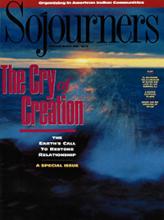On November 16, 1989, uniformed men attacked the Jesuit residence at the University of Central America in San Salvador, El Salvador, brutally killing six Jesuits, their cook, and her daughter. Jon Sobrino, S.J., an internationally known liberation theologian, had been a member of that Jesuit community for more than 15 years when this article appeared. He was out of the country the week of the assassinations; he surely would have been killed had he been in El Salvador.
On December 1, 1989, Sobrino spoke in San Francisco at an interfaith prayer service marking the ninth anniversary of the deaths of the four U.S. churchwomen in El Salvador and the recent martyrs. The following is excerpted from the remarks he made that evening. -- The Editors
I am a member of the Jesuit community which has now disappeared in El Salvador because my six brothers were assassinated. I also knew very well the four North American churchwomen who were assassinated nine years ago. In fact, in those days in 1980, I was in hiding with some others at the convent where the two Maryknoll sisters lived.
There is nothing more ecumenical than blood and love. The Jesuits, the Maryknoll sisters, and the other churchwomen were all persecuted equally. Catholics, Lutherans, Baptists, Episcopalians, and Mennonites are all being persecuted today in El Salvador.
Women and men have shed their blood -- people from El Salvador, from Spain, and from the United States. People from different confessions, from different faiths, from different places, are united in their soul, as we all are by the tragedy in El Salvador and also by the hope and the commitment of the martyrs.
We all know why these people ended in the cross, why they were killed. They dared "touch the idols of death," as we say in Latin America.
Read the Full Article
